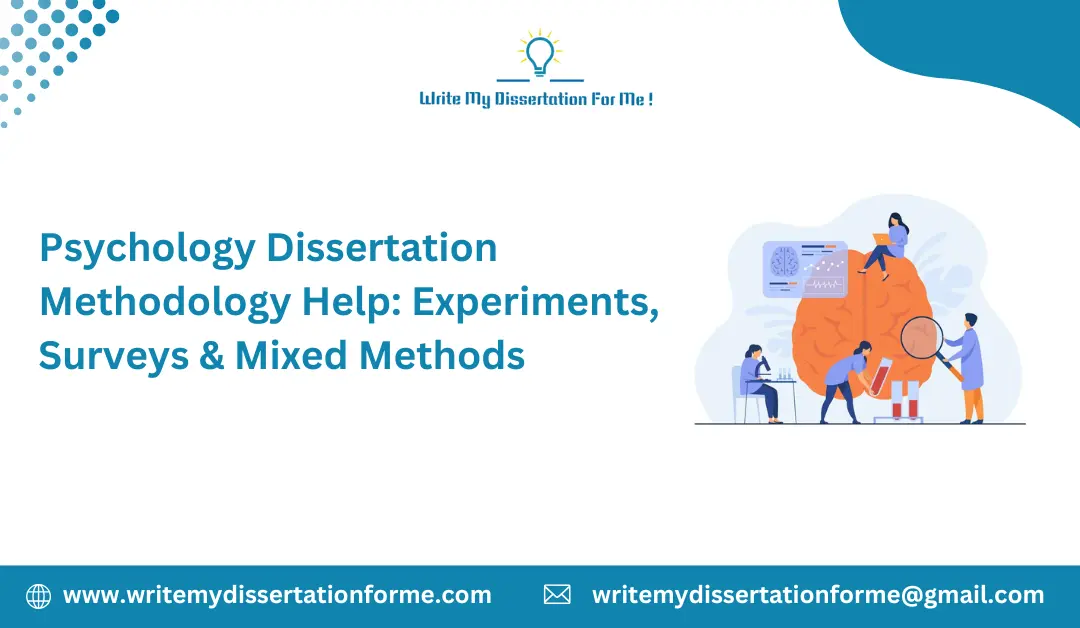Psychology Dissertation Methodology Help: Experiments, Surveys & Mixed Methods
October 29 2025 | 04 min read

Writing an engaging psychology dissertation requires a strong and well-supported approach, in addition to a thorough understanding of psychological concepts. The validity and significance of your findings depend on your approach, regardless of whether you're studying developmental patterns, social dynamics, or cognitive behavior.
This blog offers comprehensive guidance on psychology dissertation methodology, focusing on three primary strategies: surveys, experiments, and mixed methods. You're in the proper place if you need assistance with your psychology dissertation to improve your study design.
Experimental Approaches in Dissertations in Psychology:
The foundation of quantitative psychology study is experimentation. They enable researchers to determine causal links between variables and test hypotheses in controlled settings.
Important attributes:
- Variable manipulation: To see changes in the dependent variable, researchers manipulate one or more independent variables.
- To compare results and get rid of confounding variables, control groups are used.
- Random assignment guarantees that participants are distributed equally among conditions.
For instance,
A Dissertation examining how sleep deprivation affects cognitive function would have two groups complete memory tests: one with adequate sleep and the other without. The findings may show that sleep and cognition are causally related.
Benefits:
- Excellent internal validity
- Clearly defined cause-and-effect links
- Repeatable outcomes
Limitations:
- Ecological validity may be lacking.
- Ethical restrictions (such as causing anxiety or anguish)
- Frequently resource-intensive
Psychology dissertation assistance may assist you with choosing suitable variables, creating moral guidelines, and evaluating statistical results if you're thinking of using an experimental design.
Psychology Dissertation Surveys:
Large-scale data collection on attitudes, actions, and perceptions is best accomplished through surveys. They are particularly helpful for dissertations in social and health psychology.
Important attributes:
- Formal surveys: frequently consist of multiple-choice, open-ended, and Likert scale questions.
- Whether data is gathered once or over time determines whether a design is cross-sectional or longitudinal.
- Surveys can be made to collect both qualitative and quantitative data.
For instance,
A standardized anxiety questionnaire sent via email may be used in a dissertation examining university students' anxiety levels. Trends and correlations can be found by statistically analyzing the responses.
Benefits:
- Economical and expandable
- Able to connect with a variety of demographics
- Beneficial for generating hypotheses
Limitations:
- Response bias risk
- Less thorough than interviews
- Requires that instruments be carefully validated.
Survey design assistance for students looking for psychology dissertation methodology help includes developing trustworthy questions, testing tools, and selecting an appropriate sampling plan.
Dissertations in Psychology Using Mixed Methods:
By combining quantitative and qualitative methodologies, mixed methods provide a comprehensive understanding of psychological phenomena. This approach is becoming more and more common in dissertations that examine intricate, multidimensional topics.
Important Designs:
- Sequential: One approach comes after another, such as surveying first, then interviewing.
- Convergent: Both approaches are used concurrently, and the outcomes are contrasted.
- One technique nestled inside another is called embedded (e.g., qualitative interviews within a bigger survey).
For instance,
Surveys to measure stress levels and in-depth interviews to examine personal narratives could be used in a dissertation on coping mechanisms among trauma survivors. The results are enhanced by this dual strategy.
Benefits:
- Blends contextual depth with statistical rigor
- Explains the drawbacks of single-method architectures.
- Triangulation improves validity.
Cons:
- Complex and time-consuming
- Need knowledge of both approaches.
- Data integration can be difficult.
Mixed techniques are especially useful when study issues call for both nuanced understanding and numerical patterns, claims Simply Psychology. Help with data integration, sequencing techniques, and result interpretation is crucial for students in need of psychology dissertation assistance.
Choosing the Right Methodology for Your Psychology Dissertation
Selecting the right methodology depends on your research question, available resources, and ethical considerations. Here’s a quick guide:
| Research Focus | Recommended Methodology |
|---|---|
| Causal Relationships | Experimental |
| Attitudes or Behaviors | Survey |
| Complex or Layered Phenomena | Mixed Methods |
If you're unsure which path to take, Psychology Dissertation Methodology Help can assist in aligning your topic with the most effective design.
Moral Aspects to Take into Account:
It is impossible to compromise on ethical compliance, regardless of the approach. The concepts of participant welfare, confidentiality, and informed consent must all be followed in psychology dissertations. To prevent psychological injury, experimental designs in particular need to be carefully examined.
Ethical concerns about participant representation and data integration are also brought up by mixed techniques. To prevent bias or misunderstanding, the American Psychological Association stresses openness and clarity when combining approaches.
Resources and Methods for Successful Dissertations:
- R or SPSS: For statistical analysis in surveys and experiments
- For mixed approaches, qualitative coding, use NVivo or Atlas.ti.
- Qualtrics or Google Forms: For distributing surveys
- Thematic Analysis: For analyzing information from interviews
- Common tests in survey and experimental research include regression, ANOVA, and chi-square.
Psychology dissertation assistance services may guide you through setup, execution, and interpretation if you're feeling overwhelmed by the choice of tools or data analysis.
Final Thoughts:
Your dissertation's approach is its engine; it propels your research and establishes its validity. Selecting the appropriate strategy is essential whether you're testing cognitive ideas with experiments, applying surveys to comprehend social behavior, or combining techniques to investigate psychological complexity.
Expert Psychology Dissertation Methodology Help can enable you to confidently create, carry out, and present a methodology that fits academic requirements and your objectives. Do not forget that your dissertation is a contribution to the area of psychology, not merely a requirement.
If you loved reading this, please share this,
also read

Writing a marketing dissertation
Writing a dissertation in marketing is an absolutely new experience that requires doing independent research. One has to work...

The Impact of Professional Editing on Your Dissertation Introduction
A dissertation, which displays years of research, critical thought, and intellectual rigor, is frequently the pinnacle of an ...

Write My Political Science Dissertation For Me
Is the thought of having to write your dissertation in political science overwhelming you? Are inquiries such as Can I hire s...